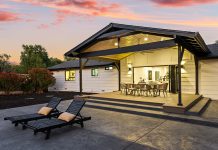Intuitive and integrative farming
Festivities this month mark the 40th anniversary of Wine Road, founded by Millie Howie. In honoring her, I wish to acknowledge the privilege of carrying forth Millie’s column with Wine Words. Millie’s intelligence, humor, good sense and responsible, creative leadership spearheaded so many traditions we still hold dear.
Thinking of another hero, I had tea with Lou Preston recently to learn what’s new in his world of organic and biodynamic farming. The Prestons settled in 1973 on what has become a 125-acre property with vineyards, row crops, orchards, sheep and chickens. They are a bridge between the past and present of Sonoma County agriculture, and hopefully a harbinger of what is to come with our lifestyles and business of winegrowing.
“We felt like we discovered little Italy in Dry Creek Valley when we harvested our first and only crop of prunes and delivered them to Sunsweet,” said Lou.
Lou reflects they knew nothing about chemicals in the early years and stayed away from them until they had too many acres to care for without help.
“It’s what we all did because we didn’t know any better. By 1988, Susan and I became concerned about the health of our family living on the property while using materials that weren’t natural. We looked into organic certification and began farming a few organic acres.”
They quickly discovered that organic gardening isn’t about what you don’t do — it’s about what you do. Developing strategies and programs to build a balanced environment, they eventually stopped using everything but vineyard sulfur and even then they sometimes substituted compost tea for mildew control.
In 2000, they underwent a further reinvention of themselves, downsizing from 25,000 cases to 8,000 cases of wine and hired Consultant Amigo Bob, “who instilled the right kind of thinking and established procedures that became a truly sustainable rebirth, with a diversity of crops,” said Lou.
Amigo introduced the Prestons to the sustainable farming community through Eco-Farm (www.eco-farm.org). By networking with farmers, nutritionists and politicians struggling with similar challenges, a paradigm shift occurred as they began to consider farming as a long-term commitment.
Building the future for the next generations, they realized they couldn’t expect instant results. It takes time for land to heal and satisfaction came in feeling the return on investment was an existential and meaningful return, beginning with the health of their land and family. Since 2002 all Preston crops are CCOF Certified Organic, and Demeter Certified Biodynamic since 2015.
“Farming is a difficult profession. What’s important is to envelop a market and become one with it on a very personal level. It’s about nurturing relationships with tasting room customers that connect when they feel the organic experience. I am encouraged as I see an interest in small, passionate family-based wineries, the way it used to be. Consumers appreciate farmers who are close to the land and engaged with the growing environment. More and more consumers want to know their local farmer and winemaker,” says Lou.
The Prestons view the wine community as part of the farming community, working together to build awareness of food and wine as coming from same terroir and environment. Lou believes advantages of integrating food crops into the vineyard are that customers fall in love.
When they visit to taste wine, they delight in seeing zucchinis, carrots, sheep and hens. They learn that hedgerows, which offer a visual awakening with a patchwork of color and life, provide habitat for beneficial insects. “It’s like going to Grandma’s house and a great way to build a relationship. More importantly, nature works best with this organic and diversified environment,” explains Lou.
Almost a half-century after the Prestons began growing grapes and making wine, I asked Lou what has changed the most. He is impressed by the greater consciousness and recent awareness of the fragility of the environment.
“When my colleagues and I started we were wearing blinders, focused on grapes and making wine. We saw neither the potential problems nor opportunities. Now, winegrowers are aware of consequences of farming practices and are certainly more health conscious.”
Lou is hopeful that younger generations are making independent decisions rather than trusting conventional wisdom, and thinks the newest interest in farming is the spiritual side. “Biodynamics personalizes farming. Your inside spirits connect with the land. It is not magic. Rather, Biodynamics encourages an intimacy of the human with the land,” reflects Lou.
What’s next? Lou and Susan wish to leave their land healthier than when they found it, and make sure it’s preserved as farmland for the future. “As long as the health and the integrity of the land are honored, that’s what we care about,” said Lou.
Relevancy for today: The Prestons are a model for intuitive and integrative farming, shaping their land as a lifestyle for their artistic family. Here’s to hoping more farmers will adopt healthier farming practices in all of our Sonoma County vineyards.
Marie Gewirtz represents wine and food clients with marketing and communications in Sonoma County and throughout the world. She can also be found maneuvering tractors on the banks of the Russian River with her two-year-old grandson. She can be reached at wi*******@********st.com.








